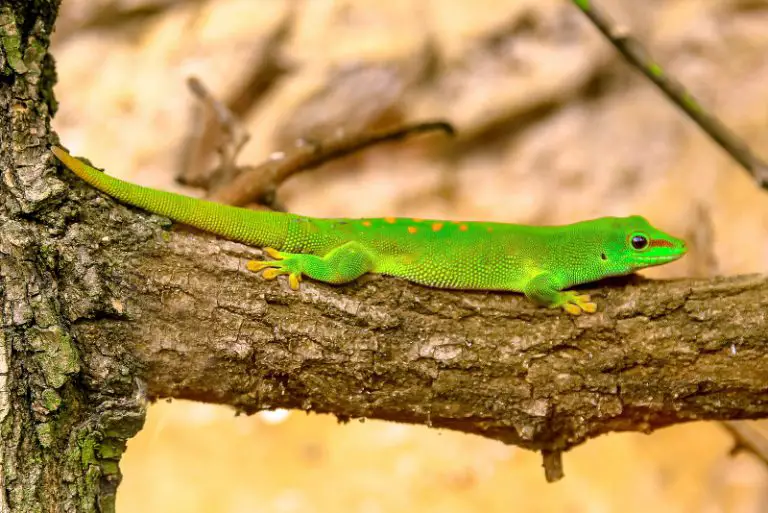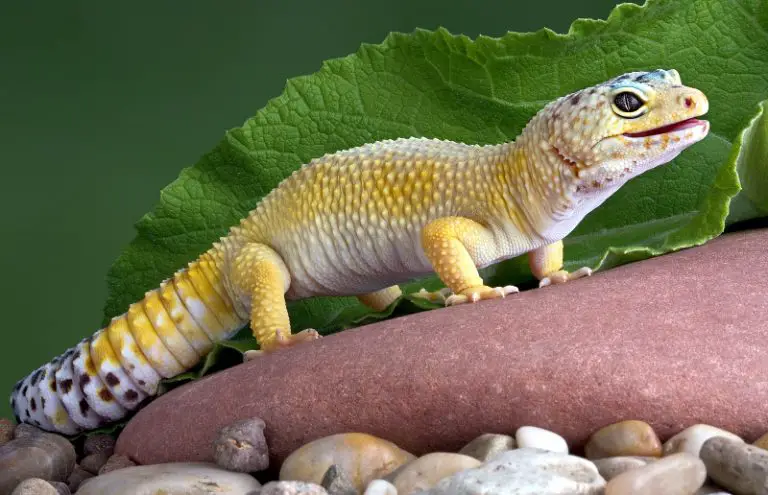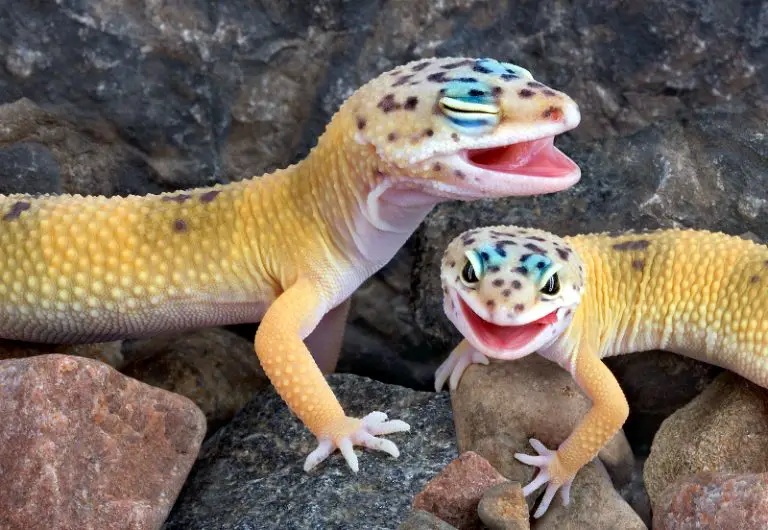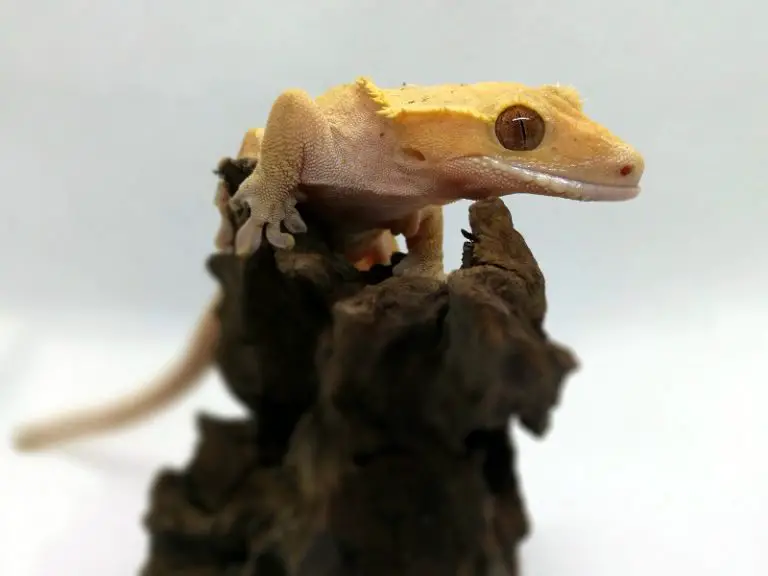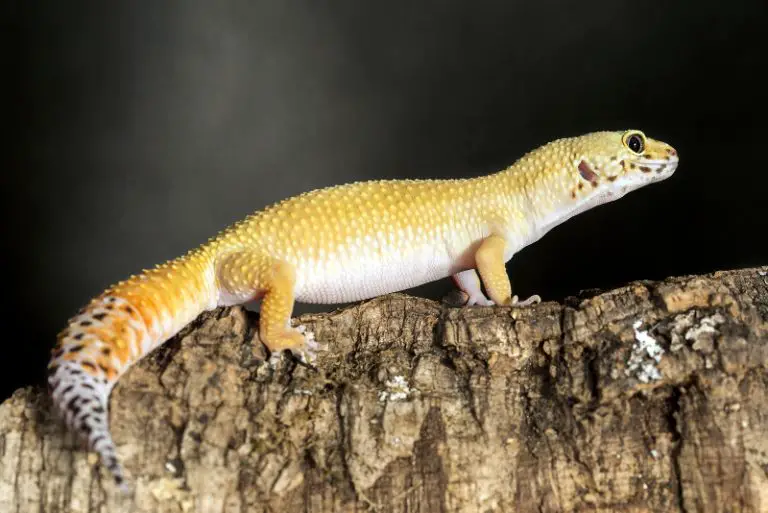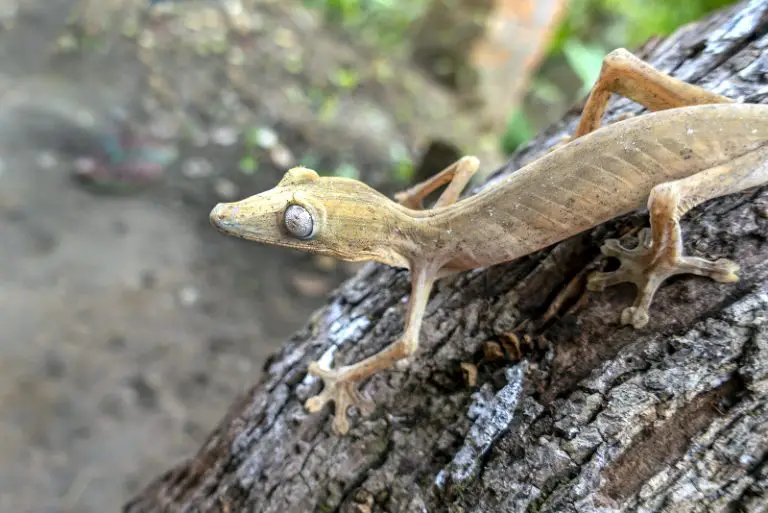Do Crested Geckos Bite? What to Do & How to Avoid
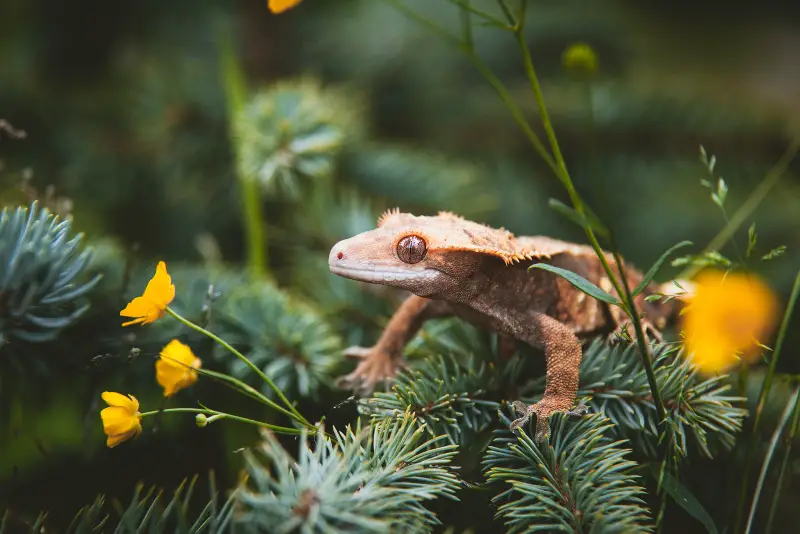
Curious about Crested Geckos and their behavior? Wondering Do Crested Geckos Bite? Sometimes, when people purchase a crested gecko, they notice that it’ll bite them. Why do they do this? Does it hurt? Is there a reason to be concerned?

Fortunately, crested geckos don’t bite very often. They only do so out of defense when they’re scared or feel threatened. Crested geckos are pretty docile and friendly creatures. It’s not often that they’ll bite, and their teeth are too small to do any damage. Still, it isn’t a behavior that you want your new pet to make a habit of.
To work on getting your crested gecko to stop biting, you first need to understand why they do it. I cover this in this guide, as well as information about crested gecko teeth, what to do if you are bitten and how to handle crested geckos safely.
Contents
Table of Contents
Do Crested Geckos Have Teeth?
Many people think that crested geckos don’t have teeth. If you open their mouths and look inside, it’s probably going to look like they don’t have teeth. But they do!
Crested gecko teeth are so small that they hide within the mouth. Most people can’t see them with the naked eye. Still, crested geckos have a total of 177 teeth.
Crested Gecko Teeth
These geckos have teeth, and they are born with fully formed teeth that are already intact. They don’t have baby teeth as humans do. Instead, their teeth will be replaced every few months while they grow.
Even though crested geckos have teeth, they don’t chew their food. Their teeth are improperly aligned, so they’re incapable of chewing things. To use teeth for chewing and shredding, teeth need to be appropriately aligned. Instead of chewing, they swallow their food whole.
What are their teeth used for, then? What is the point?
Even though crested geckos can’t use their teeth to chew and shred prey, they can use their teeth to catch their prey. Hundreds of tiny, sharp teeth allow the gecko to grip and crush small insects.
Check out this How To Care For A CRESTED GECKO video:
Do Crested Geckos Bite?
Crested geckos certainly can bite, although it’s rare. They only bite when they’re frightened or stressed. Also, because their teeth are so small and inefficient, the bites are very unlikely to hurt or cause injury. More on this later.
Why Might A Crested Gecko Bite You?
A crested gecko will bite only if it’s fearful or stressed. Biting most often occurs during the first few weeks of owning the pet. Some new gecko owners don’t know any better and will force their geckos to interact with them.
Forcing interaction will stress a gecko out and force them to be defensive. To prevent this, keep reading. We’ll review all the tips and tricks needed for handling and taming your new gecko.
There are other things besides handling that can cause a gecko to become stressed. If they don’t like the way their enclosure is set up — not enough foliage, improper temperature/humidity, etc. — they may become more aggressive.
Younger geckos may sometimes mistake your fingers for food as well, and will bite simply because they’re hungry. This isn’t much to worry about, and they will likely outgrow the habit.
Adult crested geckos are unlikely to be aggressive because they’re friendly and docile creatures. However, new owners rarely know the history behind their new, adopted pet. If you bring home an adult gecko, there is a chance that they have been mistreated in the past. Give them extra patience to let them know you’re not a threat.
Some geckos really like hunting for live food. Many geckos are fed a diet of only commercially-made food. This is perfectly acceptable, but other gecko owners feed a mix of live and fresh foods.
If you’re adopting an adult gecko that is used to hunting for their food, they may become aggravated if this option is suddenly taken away.
Does A Crested Gecko Bite Hurt?
Because their teeth are so small, it really doesn’t hurt to be bitten by a crested gecko. Many people don’t even realize when they’ve been bitten because their teeth are so devoid of any power.
Their teeth are very small, and they’re not designed to tear flesh, so they don’t cause any damage.
Rather than hurting, a bite coming from your crested gecko is more likely to feel like a small nip.
Still, even though it doesn’t hurt, it’s not a behavior you want to encourage. For one thing, geckos will only bite if they’re stressed. You want to avoid doing anything that stresses your gecko out. Doing this won’t give them any reason to want to bite you.
Signs A Crested Gecko Might Bite You
Because animals can’t speak to us, it’s important that we pay attention to their body language to see what they have to say. Crested geckos, although docile, don’t like to be handled very much.
Just as you wouldn’t force another human to hug you, you shouldn’t force an animal to interact with you if they don’t want to. If you plan to handle your crested gecko, you need to go slowly and be patient. Build up your interactions over time and don’t force everything at once.
Fortunately, animals are very good at showing us how they feel through their body language. You just need to learn how to read that language.
Body Language
Crested geckos will only bite a human if they are feeling fearful or stressed, so it’s important to look out for signs of that. If you see your gecko becoming uneasy, it’s likely about to bite you, and you should put it back in its enclosure to destress.
Here are some signs that your gecko is stressed and about to bite:
- Twitching or flicking of the tail
- Keeping their mouths wide open
- Squeaking or clicking noises
- Watching their handler very closely and eyeing their fingers
- Refusing to eat, or increased appetite
Crested geckos also tend to be protective of their food, particularly if they’re hungry. You shouldn’t try to handle your gecko during feeding time as this will just upset them further. Geckos instinctively become more aggressive during feeding time. They will begin to jump around and may try to bite you.
Obviously, if you witness any of these behaviors, you should back off. If the gecko is in its enclosure, leave it there, and don’t attempt to handle it or interact with it. If you are already handling the gecko when this begins, put it back in its enclosure immediately and let it destress.
How To Stop A Crested Gecko From Biting
Crested geckos will only bite if they’re fearful and stressed. The main cause of bites are from people trying to handle their geckos when they’re not ready, or handling them excessively.
New Geckos
When you first bring your gecko home, you shouldn’t try to handle it right away. The gecko is already going to be stressed from being placed in a new environment. Trying to handle it during this time will only produce more stress.
When you first get your gecko, limit contact with them as much as possible. Instead, just feed them regularly and leave them alone. You’ll want to give them at least two weeks to adjust to their new home before you begin handling it.
Limit Handling
When you do begin to handle your gecko, be sure not to do it for too long. Handling is very stressful for new geckos, so prolonging the session will only stress them out.
When you begin handling sessions with your gecko, you should keep them short. Don’t handle your gecko for more than 4-5 minutes at a time.
As we said above, it’s very important that you keep an eye on your gecko’s body language. Don’t push them. If they are uncomfortable and you try to force them to bond with you, they may become injured. Crested geckos are excellent jumpers and will try to get away from you if they’re afraid.
What To Do If You Are Bitten By A Crested Gecko
You really don’t need to worry if you’re bitten by your crested gecko. Their teeth are so tiny that you might not even feel it. They’re not capable of tearing skin, so you’re not likely to receive any damage. Therefore, you don’t often need to worry about disease or infection. Crested geckos don’t carry transmittable viruses.
Bacteria & Fungi
However unlikely, if your crested gecko does manage to break skin, you will need to worry about bacteria and fungi.
Salmonella is a common bacteria carried by geckos that can be transferred to humans. Even if your gecko shows no symptoms, they can still be carriers of the bacteria.
Washing Your Hands
If you’ve been bitten by your gecko, make sure you wash your hands thoroughly with antibacterial soap. Even if you don’t think the gecko has broken skin, it’s still best to wash your hands to be safe.
Children should always be monitored when handling crested geckos to prevent biting. Their immune systems are not fully developed, so they’re more likely to pick up fungi or bacteria from the geckos.
How To Handle A Crested Gecko Safely
Being brought to a new home can be very stressful for new pets. Imagine that you were living somewhere your whole life, just to be taken away with no explanation, and placed in a new location with unfamiliar people. It would be terrifying, and this is how your new gecko is going to feel.
Acclimating To Their New Surroundings
These first few weeks that you have your new gecko are going to be the times your most likely to get bitten. Your geckos are going to be fearful and defensive which may cause them to lash out.
You should wait a few weeks before handling your new gecko, as this will give them a chance to relax and settle in. We’ll go into this more later.
Steps For Handling
When you are ready to begin handling your new gecko, there are ways to do it safely, both for you and your new pet.
- Besides giving your gecko a few weeks to settle in before handling, you also shouldn’t handle your gecko until it’s at least 3 inches in length.
- Handle your gecko in a room that is free of distractions.
- Loud or unfamiliar noises and sights will scare your gecko.
- If possible, take the entire terrarium into this stress-free environment and remove your gecko from it’s terrarium there.
- Place your hand inside the tank, palm-up, to show that you’re non-threatening.
- Go slow — bring your palm towards the gecko cautiously so that you don’t scare them away.
- Don’t force it. Don’t try to pick the gecko up. Instead, wait for it to walk into your hands.
- Don’t get discouraged if your gecko doesn’t walk into your hands on the first attempt. Keep trying and be patient — it might take a few tries.
How To Tame Your Gecko
Although crested geckos don’t necessarily like being handled, they are very easy to be tamed. They are very docile and friendly critters which is one reason why they’re so popular.
Just because they’re docile and tame doesn’t mean you should try and take advantage of those characteristics. Watch their body language, give them time, and be patient. If you try to push it, you will never build up trust with your gecko, and you might never be able to handle them.
The Taming Process
Trying to teach your new gecko that handling is okay can be stressful, especially if you’ve never done it before. To make things easier, we’ve provided a list of things you can do to make the process go smoother:
- Crested geckos are nocturnal. This means that they’re most active and alert at night. It’s much easier to handle your geckos during the day because they’ll be more subdued and less likely to run away.
- Likewise, you should refresh their food and water in the afternoon. This will help them better adjust to their surroundings because they’ll usually be asleep during this time.
- Handle your geckos every week while you’re cleaning their enclosure. This will give you a chance to check them over and make sure they’re healthy. It’ll also give your gecko a chance to get used to being handled.
- When you first handle your geckos, don’t push them and force handling.
- Rather than grabbing them and handling them in your arms, place them on a branch or a piece of cardboard that you’re holding. This will make them feel more comfortable and at-home.
- “Hand” walking is another great way to bond with your gecko.
- The name may sound funny, but it simply means that you’ll let your gecko walk up and down your hands and arms.
- This exercise helps your gecko get used to you without feeling overwhelmed.
- It’s likely best to do this after a couple weeks of holding them on a branch.
The most important thing to remember when taming your gecko, of course, is to remain patient. It will usually take at least a month for your gecko to become used to you and be fully tamed.
Each gecko is an individual, however, and they each have their own personalities. Some geckos may take over a month to become fully used to their handler. Don’t become discouraged.
Conclusion
Crested geckos are wonderful lizards to keep as pets. They are colorful, friendly, and easy to handle. Unlike other reptiles, you don’t really have to worry about them biting you. Simply give them time to settle in when you get them before handling. This will prevent most biting.
Even if you gecko does bite you, it’s very unlikely that it will hurt or cause any damage. Just to be extra safe, always wash your hands after handling your gecko.
If you’re patient and work with your gecko regularly, you’ll soon develop a great bond with your lizard, and you’ll no longer need to worry about instances of biting.
Click here to find all our detailed guides to Geckos. You can also click here to learn more about fully grown crested geckos and the best food to give them here.

